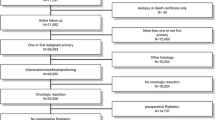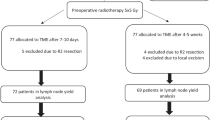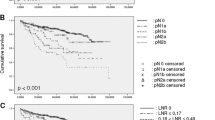Abstract
Background
The evaluation of lymph nodes in rectal cancer dictates treatment. The goals of this study are to characterize the contemporary rate of lymph node metastasis in early stage rectal cancer and to re-investigate histologic factors that predict positive lymph nodes.
Materials and Methods
Using the National Cancer Database, we identified patients with clinical stage I rectal adenocarcinoma. Multivariable logistic regression was used to determine risk factors for lymph node positivity.
Results
12.2% of patients with T1 tumors and 18.0% of patients with T2 tumors had positive lymph nodes. For T1 tumors, positive lymph nodes were present in 9.3% with neither poor differentiation nor lymphovascular invasion (LVI), 17.3% with poor differentiation alone, 34.7% with LVI alone, and 45.0% with both poor differentiation and LVI. For T2 tumors, positive lymph nodes were present in 11.7% with neither poor differentiation nor LVI, 25.3% with poor differentiation alone, 47.3% with LVI alone, and 41.5% with both poor differentiation and LVI. LVI was an independent predictor of positive lymph nodes (OR;4.75,95%CI;3.17–7.11,p < 0.001) for T1 and (OR;6.20,95%CI;4.53–8.51,p < 0.001) T2 tumors.
Conclusions
T1/T2 tumors have higher rates of positive lymph nodes when poor differentiation and LVI are present. These results should be taken into consideration prior to surgical treatment.

Similar content being viewed by others
References
American Cancer Society. Key Statistics for Colorectal Cancer. https://www.cancer.org/cancer/colon-rectal-cancer/about/key-statistics.html. Accessed: June 30, 2018.
National Comprehensive Cancer Network (NCCN). NCCN Clinical Practice Guidelines in Oncology. Rectal Cancer Version 2.2018; National Comprehensive Cancer Network.
Ricciardi R., Madoff R., Rothenberger D., Baxter N. Population-based analyses of lymph node metastases in colorectal cancer. Clin Gastroenterol and Hepato. 2006;4:1522–1527.
Bentrem DJ, Okabe S, Wong D, et al. T1 adenocarcinoma of the rectum: transanal excision or radical surgery? Ann Surg. 2005;242(4):472–479.
Nash GM, Weiser MR, Guillem JG, et al. Long-term survival after transanal excision of T1 rectal cancer. Dis Colon Rectum. 2009;52(4):577–582.
Meyer JE, Cohen SJ, Ruth KJ, Sigurdson ER, Hall MJ. Young age increases risk for lymph node positivity in early-stage rectal cancer. J Natl Cancer Inst. 2016;108(1):djv284.
Kobayashi H, Mochizuki H, Kato T, et al. Is total mesorectal excision always necessary for T1–T2 lower rectal cancer? Ann Surg Oncol. 2010;17(4):973–980.
Glasgow SC, Bleier JIS, Burgart LJ, et al. Meta-analysis of histopathological features of primary colorectal cancers that predict lymph node metastases. J Gastrointest Surg. 2012;16:1019–1028.
Saclarides TJ, Bhattacharyya AK, Britton-Kuzel C, Szeluga D, Economou SG. Predicting lymph node metastases in rectal cancer. Dis Colon Rectum. 1994;37(1):52–7.
Okabe S, Shia J, Nash G, et al. Lymph node metastasis in T1 adenocarcinoma of the colon and rectum. J Gastrointest Surg. 2004;1(8):1032–1040.
Muthusamy VR, Chang KJ. Optimal methods for staging rectal cancer. Clin Cancer Res. 2007;13(22):6877–6884.
Gröne J, Loch FN, Taupitz, M, Schmid C, Kreis ME. Accuracy of various lymph node staging criteria in rectal cancer with magnetic resonance imaging. J Gastrointest Surg, 2018;22(1):146–153.
Brown G. "Staging rectal cancer: endoscopic ultrasound and pelvic MRI." Cancer Imaging 2008;8:S43.
Monig SP, Baldus SE, Zirbes TK, et al. Lymph node size and metastatic infiltration in colon cancer. Ann Surg Oncol 1999;6:579–581.
Garcia-Aguilar J, Renfro LA, Chow OS, et al. Organ preservation for clinical T2N0 distal rectal cancer using neoadjuvant chemoradiotherapy and local excision (ACOSOG Z6041): results of an open-label, single-arm, multi-institutional phase 2 trial. Lancet Oncol 2015;16(15):1537–1546.
You NY, Baxter NN, Stewart A, Nelson H. Is the increasing rate of local excision for stage 1 rectal cancer in the United States justified? A nationwide cohort study from the national cancer database. Ann Surg. 2007;245(5):726–733.
Greenberg JA, Shibata D, Herndon JE, et al. Local excision of distal rectal cancer: An update of cancer and leukemia group B 8984. Dis Colon Rectum 2008;51(8):1185–1194.
Winchster DP, Stewart AK, Phillips JL, Ward EE. The national cancer database: past, present, and future. Ann Surg Oncol 2010;17(1):4–7.
Blumberg D, Paty PB, Guillem JG, et al. All patients with small intramural rectal cancers are at risk for lymph node metastasis. Dis Colon Rectum. 1999;42(7):881–885.
Tjandra JJ, Kilkenny JW, Buie WD, et al. Practice parameters for the management of rectal cancer (revised). Dis Colon Rectum. 2005;48:411–423.
National Comprehensive Cancer Network: NCCN Clinical Practice Guidelines in Oncology: Rectal Cancer—Version 4.2013. Fort Washington, PA, National Comprehensive Cancer Network, 2012.
Stitzenberg KB, Sanoff HK, Penn DC, Meyers MO, Tepper JE. Practice patterns and long-term survival for early-stage rectal cancer. J Clin Oncol. 2013;31:4276–4282.
Doornebosch PG, Ferenschild FT, de Wilt JH, Dawson I, Tetteroo GW, de Graaf EJ. Treatment of recurrence after transanal endoscopic microsurgery (TEM) for T1 rectal cancer. Dis Colon Rectum. 2010;53(9):1234–1239.
Paty PB, Nash GM, Baron P, et al. Long-term results of local excision for rectal cancer. Ann Surg. 2002;236(4):522–530.
Hahnloser D, Wolff BG, Larson DW, Ping J, Nivatvongs S. Immediate radical resection after local excision of rectal cancer: an oncologic compromise? Dis Colon Rectum. 2005;48(3):429–437.
Author information
Authors and Affiliations
Contributions
All authors had substantial contributions to design of work, drafted work, made final approval, and agreed to be accountable for all aspects of the work.
Corresponding authors
Ethics declarations
Conflict of Interest
The authors declare that they have no conflict of interest.
Additional information
Publisher’s Note
Springer Nature remains neutral with regard to jurisdictional claims in published maps and institutional affiliations.
The study was reviewed and approved by the Institutional Review Board.
This work was presented as a podium presentation at the American College of Surgeons Clinical Congress, Oct 21-25 2018, Boston, Massachusetts.
Rights and permissions
About this article
Cite this article
Fields, A.C., Lu, P., Hu, F. et al. Lymph Node Positivity in T1/T2 Rectal Cancer: a Word of Caution in an Era of Increased Incidence and Changing Biology for Rectal Cancer. J Gastrointest Surg 25, 1029–1035 (2021). https://doi.org/10.1007/s11605-020-04580-z
Received:
Accepted:
Published:
Issue Date:
DOI: https://doi.org/10.1007/s11605-020-04580-z




